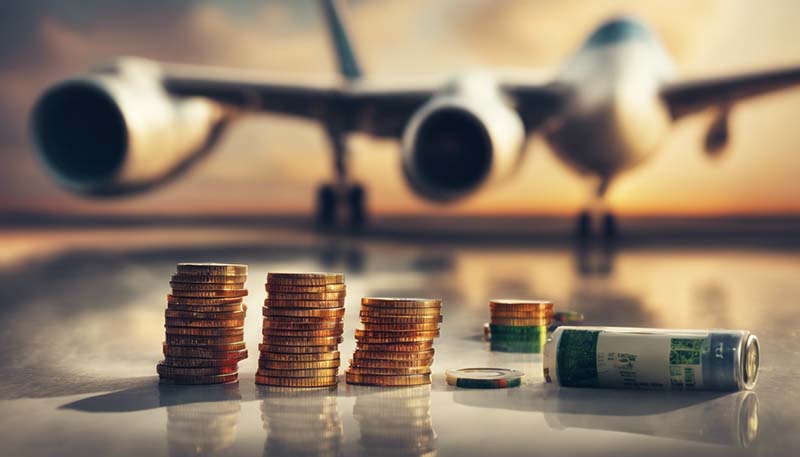The airline industry is a complex and highly competitive market that is influenced by a multitude of factors. Among these factors, fuel prices play a crucial role in determining the profitability and sustainability of airlines. This article aims to explore the impact of fuel prices on airline profitability and sustainability, discussing the various ways in which fuel costs affect the industry and the strategies employed by airlines to mitigate these effects.
Introduction
The airline industry has experienced significant growth over the past few decades, with an increasing number of passengers and expanding global networks. However, this growth has come with its fair share of challenges, one of which is the volatility of fuel prices. As fuel is the primary operating expense for airlines, fluctuations in fuel costs can have a significant impact on their bottom line. In this article, we will delve into the relationship between fuel prices and airline profitability, the factors that contribute to this relationship, and the strategies employed by airlines to maintain their financial stability and long-term sustainability.
Fuel Prices and Airline Profitability
Fuel Cost as a Major Operating Expense
Fuel costs constitute a significant portion of an airline's operating expenses, typically accounting for 20-30% of the total costs. This makes fuel prices a critical factor in determining the profitability of an airline. When fuel prices rise, airlines face increased operating costs, which can lead to reduced profitability or even losses, especially if they are unable to pass these costs on to their customers through higher ticket prices.
Advertisement
Volatility of Fuel Prices
Fuel prices are influenced by various factors, including global economic conditions, geopolitical events, and natural disasters. These factors contribute to the volatility of fuel prices, making it challenging for airlines to predict and plan for future costs. The unpredictability of fuel prices can lead to financial instability for airlines, as they struggle to maintain profitability in the face of fluctuating costs.
Impact on Airline Financial Performance
High fuel prices can have a direct impact on an airline's financial performance. As fuel costs increase, airlines may experience reduced profit margins, which can lead to a decline in shareholder value. Additionally, high fuel prices can result in increased ticket prices, which may deter some passengers from flying, further impacting the airline's revenue. In extreme cases, consistently high fuel prices can lead to financial distress or even bankruptcy for some airlines.
Strategies for Mitigating Fuel Price Impact
Fuel Hedging
One of the primary strategies employed by airlines to mitigate the impact of fuel price fluctuations is fuel hedging. This involves airlines entering into financial contracts that allow them to lock in a specific fuel price for a predetermined period. By hedging their fuel costs, airlines can protect themselves against sudden increases in fuel prices and maintain a more stable financial performance.
Efficiency Improvements
Another strategy for managing fuel costs is by focusing on improving operational efficiency. Airlines can invest in more fuel-efficient aircraft, optimize flight routes, and implement fuel-saving initiatives such as weight reduction and single-engine taxiing. By increasing their operational efficiency, airlines can reduce their fuel consumption and, in turn, their exposure to rising fuel prices.
Revenue Management and Pricing Strategies
Airlines can also employ revenue management and pricing strategies to counteract the impact of fuel prices on their profitability. By adjusting ticket prices and implementing dynamic pricing strategies, airlines can better match their revenue to the changing costs of fuel. Additionally, airlines can focus on increasing ancillary revenue streams, such as baggage fees and in-flight sales, to offset the impact of rising fuel costs on their bottom line.
Strategic Partnerships and Alliances
Forming strategic partnerships and alliances with other airlines can help airlines share the burden of fuel costs and improve their overall financial stability. Through codeshare agreements, joint ventures, and airline alliances, airlines can share routes, coordinate pricing strategies, and pool resources to better manage fuel costs and maintain profitability.
Conclusion
The relationship between fuel prices and airline profitability is complex and multifaceted. Fuel prices play a crucial role in determining the financial performance of airlines, and the volatility of fuel costs poses significant challenges for the industry. However, by employing a range of strategies, such as fuel hedging, efficiency improvements, revenue management, and strategic partnerships, airlines can mitigate the impact of fuel prices on their profitability and ensure their long-term sustainability. As the airline industry continues to evolve and adapt to the challenges of a changing global landscape, understanding and managing the impact of fuel prices will remain a critical component of successful airline management.
